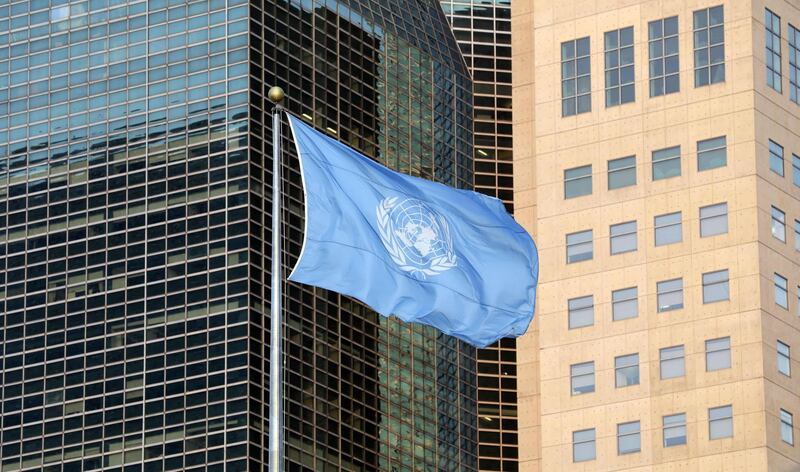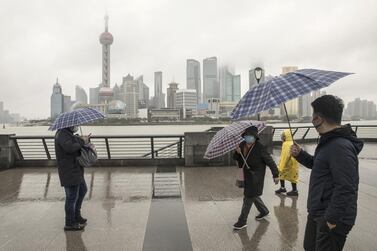The UN is calling for an economic stimulus package of $2.5 trillion (Dh9.18tn) to ease the economic pain of developing countries, where two-thirds of the world's population are facing hardship from the coronavirus outbreak.
The speed at which the economic shockwaves from the pandemic have hit developing countries is "dramatic", even compared to the 2008 global financial crisis, the United Nations Conference on Trade and Development (Unctad), said in its latest report released on Monday.
To ease the strain on developing countries, the UN is asking for $1tn to be made available through the expanded use of special drawing rights, while $1tn of debt owed by developing nations should also be cancelled this year, it said. Another $500 billion should be disbursed as grants to fund a 'Marshall Plan' for health recovery from previously promised development assistance.
“The economic fallout from the shock is ongoing and increasingly difficult to predict but there are clear indications that things will get much worse for developing economies before they get better,” Unctad Secretary-General Mukhisa Kituyi, said.
In the two months since the virus began spreading beyond the Chinese city of Wuhan, developing countries have taken an enormous hit in terms of capital outflows, growing bond spreads, currency depreciations and lost export earnings, including from falling commodity prices and declining tourist revenues, Unctad report showed.
Portfolio outflows from main emerging economies surged to $59bn in a month between February and March. This is more than double the outflows of $26.7bn seen by the same countries in the immediate aftermath of the global financial crisis. The values of their currencies against the US dollar have fallen between 5 and 25 per cent since the beginning of this year.
“On most of these measures the impact has cut deeper than in 2008; and with domestic economic activity now feeling the effects of the crisis, Unctad is not optimistic about the kind of rapid rebound witnessed in many developing countries between 2009 and 2010,” the report added.
The UN’s call for funds follows a pledge by the G20 leaders to contribute an estimated $5tn into their economies to stave off job losses and soften the impact of the deadly virus outbreak on financial markets. The US, the world’s largest economy where the infection rate has been steadily rising, approved a $2tn economic package this month to help the economy cope from the fallout arising from the virus outbreak.
As the pandemic spread, global equities lost at least $20tn in market value from their peak as uncertainty mounted and investors feared monetary and fiscal actions by the world’s 20 largest industrialised nations would not be enough to mend the damage.
The International Monetary Fund managing director, Kristalina Georgieva, has urged the G20 leadership to increase fiscal spending.
"Our advice is go big," Ms Georgieva said last week. "This is a very big crisis and it's not going to be sorted out without a very massive deployment of resources.”
The coronavirus pandemic is set to push the global economy into recession this year and the IMF expects a recovery only next year. International trade has taken a hammering and travel and tourism have come to a grinding halt as countries in Europe, Asia and North America enforce strict lockdowns to stem the spread of the virus. A halt in economic activity within some sectors could also lead to widespread lay-offs. Some 75 million jobs in the tourism sector alone are at risk, according to the latest estimate by the World Travel and Tourism Council.
Global foreign direct investment is also expected to fall by 30 to 40 per cent during 2020-21 due to restrictions on movement, Unctad said in another report earlier this month. The novel coronavirus has so far infected more than 735,000 people as fatalities reached about 35,000 globally. More than 156,000 people have also recovered, according to Johns Hopkins University, which is tracking global coronavirus spread.
Given deteriorating global conditions, the UN forecast that fiscal and foreign exchange constraints are bound to tighten further over the course of the year. Unctad estimates that developing countries are likely to face a $2tn to $3tn financing gap over the next two years.
“Advanced economies have promised to do ‘whatever it takes’ to stop their firms and households from taking a heavy loss of income,” said Richard Kozul-Wright, Unctad director of globalisation and development strategies. “But if G20 leaders are to stick to their commitment of ‘a global response in the spirit of solidarity,’ there must be commensurate action for the six billion people living outside the core G20 economies.”








